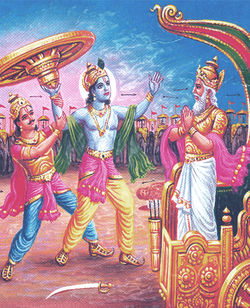Bhishma
Introduction | Index | Marvels | Books | People | Establishments | Freedom Fighter | Image Gallery | Video
This website is under construction please visit our Hindi website "HI.BRAJDISCOVERY.ORG"
Bhishma / भीष्म

Bhishma is an important character of Mahabharata. Devvrat (actual name of Bhishma), the eighth and youngest son of Shantanu and Ganga. He was renowned for his continence, wisdom, bravery and fidelity to his word. All the other sons of Shantanu and Ganga being dead, he was the sole heir to the throne.
One day, when Shantanu was walking along a river, he saw the beautiful Satyavati. She was the daughter of a fisherman. Shantanu fell in love with her and sought her hand in marriage. Her parents wanted Satyavati's son to be crowned king if the marriage took place, but Shantanu could not accept this condition and he returned to his camp. He spent his days pining for his love and did not heed to the pressures of the kingdom. Devvrat worried when he saw his father thus neglecting the state, took it upon him to solve the problem. When he came to know about Satyavati's existence from Shantanu's charioteer, he went to Satyavati's father, so that he could arrange the marriage of Shantanu and Satyavati. But the parents of Satyavati refused.
They said that if Satyavati bore a son, he would not become the king, because Devvrat, being the eldest, would be the rightful heir. Devvrat, on hearing this, took an oath not to accept the kingdom, and never to marry or have any offspring. The throne would be free for Satyavati's children. Henceforth, he was called Bhishma, for having taken this terrible vow. Shantanu, to show his appreciation of the sacrifice Bhishma had made, granted him a boon, that he could live as long as he wished and that death would come to him only when he desired. Bhishma remained firm by his oath and when his father died, he installed Satyavati's son, Vichitravirya on the throne. He arranged for him to be married to the Kashi princesses, Ambika and Ambalika. He remained counsellor and guardian to the Kauravs and Pandavs. In the Mahabharat war, he had to fight with the Kauravs. He fought bravely and with such vigour that even the strength of Arjun and Bhim paled before him. In spite of his efforts, Duryodhan accused him of being partial to the Pandavs and that he did not want to kill them.
Bhishma reminded him of the strength of the Pandavs and Krishna, and appealed to him once again to make peace with them. Thus burdened by such unjust accusations, he lost interest in life and wanted to die. He himself told Yudhishthir, a method of putting an end to his life. Accordingly, Arjun went to fight Bhishma behind Shikhandi, knowing that Bhishma would not fire at Shikhandi as he was born a woman. From behind Shikhandi, Arjun fired arrow after arrow, till Bhishma was completely covered with arrows, so that when he fell he lay on a bed of arrows, as befitting a brave warrior. And thus he lay, till the war was over and Hastinapur was in safe hands.
Mahabharata |
Abhimanyu · Arjuna · Ashvatthama · Eklavya · Karna · Kunti · · Keechak · Krishna · Ghatotkacha · Jayadratha · Duryodhana · Dushasan · Dronacharya · Drupad · · Draupadi · Nakula · · Bhim · Bhishma · · Shantanu · Yudhisthira · Vidur · Ved Vyas · Shakuni · Parikshit · · Kaurav · · Shishupal · Subhadra · · Sanjay · Sahdeva · · Shikhandi · · Shalva · · Shalya · · Dhritrashtra · · Pandu · · Adhirath · · Amba · · Ambika · · Ambalika · · Dhrishtadyumna · · Gandhari · · Lakshagrah · · Maadri · · Virat · · Uttara · · Hidimba · · Jarasandh · · Krapacharya |